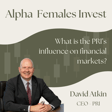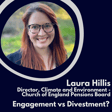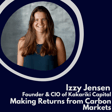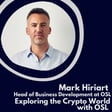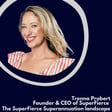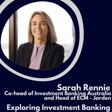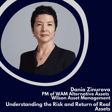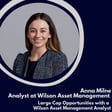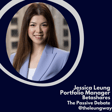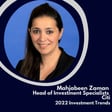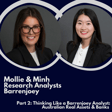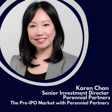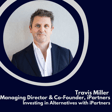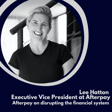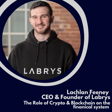Introduction and Disclaimers
00:00:01
Speaker
As usual, any information discussed in this podcast is not financial advice. All opinions reflect those of the individuals and this podcast is for educational purposes only. You should always read the PDS and talk to a financial advisor who can consider your personal circumstances before you invest. If you like listening to Alpha Female's Invest, we would love your support on Instagram at Alpha Female's Invest.
00:00:24
Speaker
And you can also find us on LinkedIn. And if you do want to find out more information about us in our episodes, you can visit our website at alphafemalsinvest.com.au. And please note that episodes may be supported by guests from time to time.
Meet the Hosts and Guest
00:00:40
Speaker
Welcome back to the Alpha Females and Best Podcast. Two females working in the finance industry searching for Alpha. My name is Maddie. And I'm Emily.
00:00:50
Speaker
And together we bring diversified perspectives from buy and sell sides of the finance world. Today, we have a fantastic guest with us, Amy Sheer-Patrick, who is Head of Income Strategies at Pendle. Amy has been at Pendle since 2017 in emerging markets and global credit indices. And Amy is a multi-asset fixed income fund manager with experience across emerging markets, global high yield and investment grade credit.
00:01:19
Speaker
Prior to Pendle, Amy was at F&C Asset Management in London, where she managed the firm's high-income bond fund, and she had roles at Thames River Capital and Citigroup Global Markets.
Embarrassing Career Moments
00:01:31
Speaker
Amy holds an honours degree in economics from the Cambridge University. Thank you so much for coming on Alpha Females Invest today, Amy. Thanks so much for having me on. Lovely to be here.
00:01:42
Speaker
To kick us off, we do like to start every episode in the same way on our podcast. And we were hoping that you could share with us your most embarrassing career moment, if you have one.
Role and Responsibilities at Pendle
00:01:53
Speaker
Oh, I have plenty. But just thinking about even very recent history, actually. So I was in Brisbane about a week ago. And this time of year, so we're recording this in March. This time of year, it's still very hot up there. I mean, it's pretty hot in Sydney as well. I think on that day, it was 37 degrees, but with humidity still in the high 70s.
00:02:20
Speaker
And every client meeting that I rocked up to, I was just like covered, covered in sweat, unable to stop sweating, unable to drink enough water. And then at one stage in the middle of a client meeting, I thought I could feel like an insect or a spider crawling down my elbow. And so I freaked out and I started whacking my elbow and not paying the client any more attention.
00:02:46
Speaker
And it turned out it was just some sweat that was dripping down my elbow. So pretty embarrassing, I reckon. The sweaty, sweaty, sweatiness in corporate outfits are just not a good combination. Can definitely relate, unfortunately. Well, thanks, Amy, for that relatable, sweaty Australia career moment. It'll be great to start off by hearing about, hearing a bit more about your role at Pendle as
00:03:15
Speaker
head of income strategies and what your role entails. Sure. So as the head of income strategies at Pendle, it's a pretty unique position even for the asset management industry. It brings together the need for not only managing money and managing investments, but it's also called upon me to think about how I would manage a business.
Diving into Income Strategies
00:03:40
Speaker
and how I would manage people within that business. And for me, this has been the great sort of evolutionary path of my career all along. It started off as just managing the trade, right? Let's not lose money on this trade. And then it started being, okay, let's manage this collection of trades called the portfolio. And then it, you know, but it coming over to Pendle and eventually, you know, being in this role, it's now called upon me to
00:04:07
Speaker
to see the world through a much sort of further back lens and to see how all the pieces fit together. So within my income strategies, even though I sit within the fixed income team, I think what I really do is asset allocation. And I know that sounds really weird, right? Because we're talking about fixed income, we're talking about income strategies. But even within fixed income, I mean, you talked about it a lot, Emily, in your beautiful introduction of me.
00:04:35
Speaker
I've done emerging markets, which has fixed income assets. I've done high yield credit, which is a pillar of fixed income, investment grade credit. And then you also do global rates, right? And different regions of rates behave differently as well. There is a lot of asset allocation to be done within even just a very vanilla fixed income portfolio. And then I complicate it even more because I go slightly beyond fixed income. And I don't shy away from even using things like equities, for example, sometimes in my portfolios.
00:05:03
Speaker
So what I do a lot of is trying to balance for the goals of my investors how to spend the right time in the markets, because we know that most markets go up most of the time. So spending time in them and trying not to be too clever is usually the way that you make money over the long term. But also knowing that, especially in today's environment, when volatility and uncertainty, particularly,
00:05:28
Speaker
is very high. How do I balance time in the markets with timing the markets?
Market Drivers and Investment Decision Process
00:05:34
Speaker
So that's the asset allocation piece. And so from the markets perspective, that's what I do. And then from the people perspective, what I've really enjoyed is the conversations within this industry about how we recruit a more diverse pool of talent into the financial industry. How do we change the goalposts so that we let more people in in the first place?
00:05:57
Speaker
I love that aspect of my role as well. Yeah, that's great. It sounds like a really good combination of helping to make decisions, investment decisions for the portfolio, but also balancing that with people management. You kind of touched on a few of the strategies that you do use in what you do, but I guess can you help our audience kind of understand what specific investments fall under the category of income strategies?
00:06:24
Speaker
there are loads of investments that fall under this category. So if you look at the income peer groups of all global research houses, they'll put all kinds of stuff in there. I recently spoke to someone who invests in a fund that harvests music royalties, for example. So any which way you can try and find a way to get income. So property, for example, might be another way. But the end of the market that I focus on, especially being within a fixed income team,
00:06:51
Speaker
is defensive income. By that, you want to be able to harvest the accruals when they're available, but you also want to dodge the bullets when they start firing. At the defensive end of the income spectrum, I do focus most of my assets and attention on fixed income products themselves.
00:07:11
Speaker
The thing that gives you the most stable carry, so the thing that is most beneficial to spend time in the markets on, is investment grade credit. And being in Australia, I'm so lucky because it is the one corner of credit in the world where there has been hardly any defaults in all of its history. I just think so everyone now, haven't I?
00:07:30
Speaker
But yes, it's a really well-known set of corporates in our space as well. They've got the ability to tap the international markets when the appetite isn't great here and then to come back here when the appetite returns. So we never get inundated in the Australian market with issuance that we don't need and we don't want. They've always got somewhere else to go. But on a risk-adjusted basis, because we're regarded by international investors and global investors as a bit sort of out of the way, right?
00:07:59
Speaker
Australian credit always carries a great little premium with it for no apparent reason that I can discern. Or rather, no fundamental reason that I can discern. And that works hugely in our favor. So that's kind of the bedrock of my portfolio. But like I said earlier, I don't shy away from going into equities as well. And the key reason for me to do that in my kind of income strategies that do focus on dodging the bullets when they happen is so that I know that when I go up the risk curve,
00:08:26
Speaker
the riskiest piece of my portfolio is the most liquid piece. So it's the piece that I need to be able to switch off the quickest when those bullets start firing. So I don't really bother with all the intervening pieces. So in my career in London, I focused a lot on high yield, emerging market corporate debt, CCC space, very close to the cusp of default, maybe even distressed. That stuff is great, but it's not defensive. It's not this kind of stuff that you can get out of and switch off at the click of a finger.
00:08:57
Speaker
Whereas going into equities, even Australian equities that are regarded as a bit sort of out of the way, you can get out of them very, very quickly when all of a sudden the sentiment turns. And that's what I need to be able to do in my portfolios. Great. Thanks so much, Amy. It's really interesting to hear how your role entails you to be across.
00:09:16
Speaker
both FI and also equities. Maybe to dive back into fixed income, I'm curious what you're seeing as the biggest market driver on the fixed income market at the moment and just historically. Yeah, they're very different things depending on when you're asking me that question, right? So you could have asked me that question at any point in the decade post the GFC.
00:09:42
Speaker
And I would have told you the biggest driver is growth and the fact that growth is so low and we're always worrying about where the next recession is coming from. That really is driving bond markets. And so for the longest time, any time you had any kind of backup in bond markets, you got the correction really quickly because people just
Navigating Bond Markets
00:10:01
Speaker
needed bonds because they needed the safety.
00:10:03
Speaker
and in a low growth environment that that's all bond markets ever cared about. But if you zoom out and you look across a longer period of history, I now can identify the post GFC period as being a bit of an anomaly for bond markets and for the macro regime in general. And really, it was to do with the severity of the GFC. If you're looking at the side of the GFC, so including more recently since the COVID crisis,
00:10:28
Speaker
And then also back into the 90s and you know even further back then that you used to have proper business cycles so when I think about you know my entire career as predominantly a bond manager I Sort of think well when I come to the office every day, and I decide how to position my book This is what I look for I look for is inflation a problem is growth a problem
00:10:55
Speaker
Are we at any threat of a sudden recession that comes out of the blue? And are the equity markets having a good time? So I would distill it into those four things. And I think they matter to different extents at different parts of the cycle, but they always matter. And I think any process that looks at how you should be investing in bonds that doesn't capture all four of those things will always miss something at some point of the cycle.
00:11:24
Speaker
Thanks, Amy. So out of those four factors that you mentioned, is there one factor that is most important or that has upended the market the most in the past?
00:11:36
Speaker
So for the bond market, most recently, the one factor that nobody saw coming was inflation, for sure. And we all on this podcast and all the listeners have had real life experience of it. I just balk at my grocery bill these days.
00:11:55
Speaker
But yeah, it's totally inflation and because for 10 years after the GFC, we'd been trained to not expect inflation. I think the bond markets were really ill-equipped to deal with it, self-included actually. It took me a long time to change my assumptions about the way that the world worked because you're challenging these very long held beliefs about relationships that should hold.
00:12:22
Speaker
And now, looking back, everyone can say, oh, it's so obvious all this stimulus, it was going to come out somewhere. And of course, it came out in inflation. But because the bond markets were full of people like me who had spent the majority of their careers watching bond prices only go up and not go down, watching whatever shock that hit bond markets reverse itself in an instant, and then they could carry on the party, I think the market at large was very ill-equipped to deal with the regime shift that we then saw.
Confidence in Investment Decisions
00:12:52
Speaker
Thanks, Amy. That's really interesting. And maybe it would be good for our listeners to touch on how does inflation impact the rates environment and therefore the bond markets ultimately? Great question. So this probably needs a little bit of
00:13:12
Speaker
explanation about what moves bond markets in the first place. And what kinds of decisions will generally entail interest rates to go up and down. So central banks in most of the developed world are independent. And their main task is to control price stability. Inflation problems are a sign that they don't have price stability on the control. And a good way for central banks to get that under control is to tighten monetary conditions. So they raise interest rates.
00:13:42
Speaker
those interest rates rise, bond yields also rise. And as a result, when you have high inflation and central banks feel like they've missed a trick and they need to be raising rates really rapidly, which is exactly what they did in 2022, it makes bond yields rise very, very fast as well. Now bond prices are inversely
00:14:03
Speaker
related to bond yields. So the higher the yield goes, the lower a bond price falls. And for most investors in the bond market, they own bonds. So it was a very painful experience in 2022. Yeah, that's a really good background to, I guess, your process and what kind of impacts the market. But we wanted to change direction a little bit here and really dive into how you go about making an investment decision.
00:14:34
Speaker
I think it is obviously a talent to be able to have confidence in making a transaction or making an investment decision and potentially hundreds of million dollars on the line. I guess everyone wonders if they would be able to have the confidence to do that one day. So I'd love to dive into maybe how you think about the investment process and how you make sure it's authentic to
Authenticity in Investment Processes
00:15:01
Speaker
you and how you're thinking about the decision.
00:15:04
Speaker
Yeah, so the confidence piece hasn't always been there for me. I would say that I really had to fake it at the beginning because I saw everyone else so confident around me. But I would argue that in the very beginning, I was successful in the markets just because the whole market went up. So I came into the industry in 2004. And between 2004 and the GFC, everything just went up.
00:15:28
Speaker
So the confidence that I saw all around me was probably also related to the fact that everything that they touched went up as well, because that was the market that we were in. But because I never figured out what I was doing right when things went right, I was never able to fully tap into that confidence in the earlier parts of my career. And it wasn't until later on that I had moved around a few different places. You'd mentioned Thames River was one of them, FNC was another. When I observed lots of different
00:15:58
Speaker
institutions with their own investment processes. I tried a few on, not all of them fit quite. I mean, most of them didn't fit. They didn't feel authentic to your point, right? They were an institution's way of sort of illustrating, well, this is the value that we bring to investing and therefore this is how we think about an investment. But for me, it didn't sort of align with anything that made sense in my head. Then I came to Pendle.
00:16:23
Speaker
And one of the things that I discovered at Pendle was all these bits of investment processes that I was trying on before coming to Pendle were sort of philosophies that weren't actually being practiced. Pendle was the first place that I came to where they practiced what they said. So they write an investment process that all investors can see.
00:16:44
Speaker
and they actually do what they say. That's really powerful because it means that your investment process works. We're still in business, so the process works. Now, over time, I've definitely adapted that, but the heart of the process, what I've learned in my time at Pendle is this. You need a system for digesting the sheer amounts of information that we have out there.
00:17:08
Speaker
in the digital age and in the AI age, we're just going to get more and more information. There's going to be like, I don't know, now casts that are like telling you what people are spending right this second, right? And everyone's going to be clambering to get their fingers on that information.
00:17:25
Speaker
So given there's so much information out there, you just need an efficient way to digest it. So any system, any process, any investment process that is worth its salt should be able to do that very efficiently for you. And the reason you need to digest it efficiently is so that you can sort all the noise and there is so much noise, right? There is so much jargon, there is so much opinion being thrown around that you need to cut through all of that to get to the truth, what I call the signal.
00:17:51
Speaker
And you need to be able to do it in not only an efficient way, but also an objective way. And what I mean by that is we all know that in investing, whether or not you're making money or losing money has incredible amounts of influence over your psychology, your mental state at that point in time. If I'm carrying losses, the way that I approach a new decision may be entirely different.
00:18:12
Speaker
if I'm carrying gains or if I'm just totally neutral. I'm aware of that as a human bias. I won't pretend that I'm a robot. So an important part of an investment process is to ensure that despite those biases, your guardrails remain on in your investment process. That you ensure that regardless of whether you're coming into a training decision,
00:18:35
Speaker
with a gain or a loss, the quality of that decision remains as high as possible. So the last piece, after you've digested all this information, you've objectively sorted the signal from the noise. How do you go about making the decision? How much risk do you take? What direction do you bet? When do you decide that you want to take profits on your trade or you want to cut losses on your trade? That, to me, is really refining your decision process. And this is an iterative process, I think. Here is where I'm still learning. I've learned over the years that
00:19:05
Speaker
However hard it is, it's important to put probabilities around scenarios that may or may not happen. So I have my base case always about what's going to pan out and how my positioning is going to go. But what's more important than that is knowing how to spot when I'm wrong. Because it's really, again, one of these investment biases, right? This sunk loss aversion, this just general, you know, sure loss aversion makes it really hard to cut losses when something's gone against you.
00:19:34
Speaker
And it's even harder in the moment to decide to do that because all the emotions are swirling around in your head. So to be able to have a plan before you actually engage in the trade. So I don't know if you know the author Annie Duke. She's a world pro poker player, but she's retired now and she writes a lot of books on.
00:19:52
Speaker
good decision making, but she calls them kill criteria. So I just call them markers to tell myself that I am wrong along the way. The more that I can plan for that before I actually engage in a position, the more I know that it's likely the decision will likely to be a good decision. And another thing about good decision making is just because the decision was good doesn't guarantee that the outcome will be good, right? Once I've made the decision, I release it into the market. So many other forces are at work that are beyond my control.
00:20:19
Speaker
at that point. But I know that the quality of the decision means that I've tilted the odds slightly my way. So if I get to just manage the risk, don't go all in on any one trade. And I managed to stay in this kind of good decision making process and repeat it again and again.
00:20:39
Speaker
the results will speak for themselves if the decision-making process was good.
Changing Investment Theses and Bond Cycles
00:20:42
Speaker
But if I only focus on the result without analyzing what I did that led up to that result, then I've got no way of trying to repeat any success that I incur along the way. So I would say those are probably the elements of my own investment process that really keeps me true to myself. It keeps me accountable for the decisions that I make. And the tweaks that I've made along the way to the original process that I learned at Pendle was simply to
00:21:06
Speaker
force my process to ask me to take more risk. Because I know that, and this is probably true of quite a lot of female investors, I would imagine, is I'm not a big risk taker generally in life, right? I like, I don't know, hugging the walls for some reason. But it makes me an incredibly good risk manager for this industry. So it makes me really good at, especially in the fixed income world, right? Being able to protect against the downside, being able to deliver that sort of defensive return profile
00:21:36
Speaker
Now, how I harness that, that strength just plays through by itself. But to be able to offset the dark side of that, which is not taking enough risk when my conviction levels are so high, I then have to just code that into my investment process. My process forces me with a certain level of conviction to take a certain level of risk that I probably subjectively
00:21:57
Speaker
would be a little bit nervous to do. And that's also paid off in spades, right? Because I trust my process. And so I should back that with the right amount of risk as well. Yeah, I think that's really interesting kind of walking us through. And it really comes down to understanding the biases that you exist, not making decisions when you're emotional, and updating your information or investment thesis as that information becomes available and not
00:22:25
Speaker
writing on, not anchoring yourself to a previous one source of information, just continuously making sure that you're adapting to the relevant information that is out there. So that's really interesting.
00:22:40
Speaker
Yeah, definitely. And one really good example in recent history we can all think of is Bitcoin, right? At one point, and it's such a new asset class, cryptocurrencies, we all thought it was, I think the strongest investment thesis at the time was it was meant to be uncorrelated to other things, right? And it was going to be a protection for inflation. And really, what it's still about is this belief in decentralization.
00:23:08
Speaker
But for a long time, that theme, that it was a protection for inflation existed. But what you didn't see people doing was when it proved to be highly correlated with inflation, to turn around and say, well, I got that wrong and therefore I'll exit. The same people just evolved their investment thesis. So it was never about this, it was about something else. And I think that's when you lose track of why you were in the trade in the first place, and then you lose the ability to even stop out of that trade.
00:23:38
Speaker
Great. Thanks so much, Amy. That's a great example. And you've shared lots of insights, which have definitely no doubt provided some valuable advice and prompted some reflection for listeners in terms of how we can apply rigor to our investment process and keep it dynamic and make sure we're holding ourselves accountable.
00:24:05
Speaker
Now to pivot a little bit back to your, to fix income, we've heard you discuss the concept of asymmetry in owning bonds before. Could you explain what that is, please, Amy? The asymmetry isn't always there in bonds. So when bond yields were, I think at their lowest point, US 10 years, or at 33 basis points, the asymmetry, I mean, there was asymmetry, but it went, it was the other way, right? You had far more,
00:24:34
Speaker
likelihood of losing money than you did making money. But in normal yield environments, and I would call this a currently normal yield environment. So looking at, again, just taking US 10 year bonds as an example, you've got a yield of around 4, 4.25%. That is a cushion that gives you an asymmetric positive bias to your advantage. If you've got a long enough time horizon, clipping that coupon of 4 to 4.25% a year
00:25:03
Speaker
will help you withstand some volatility along the way. That's really what I mean by the asymmetry. Now, in the third quarter or fourth quarter of last year, those bond yields got up to even 5%. It just meant that at those kinds of yields, you could see, let's say, the market get carried away with a narrative that maybe the next move from the Fed will be a hike and not a cut. And all of a sudden, yields sell off by
00:25:31
Speaker
something like another 100 basis points. Well, at 5% yield, you could withstand that sell-off in bonds and still come out flat. That's the beauty of that asymmetry. Whereas if bond yields were to move 100 basis points lower the other way, then you stand to make double digit returns with a 5% yield on the bond. So that asymmetry is definitely working in your favor in bond land at the moment. And just if you could,
00:26:00
Speaker
if you don't mind touching on the different trading styles that exist, and maybe this ties into your previous answer on developing your own investment style, but also how can you develop your own trading style? So trading style and investment styles are different, I think. I started my career as a trader, and I've already explained how risk averse I was, so I was
00:26:20
Speaker
always in for the quick buck. So I'd spot an opportunity, go in, make a few points, get out, bank it, and then look for the next opportunity. I think most traders that start off from the sell side generally have that mentality, partly because on the sell side, your main job as a market maker trader is really to provide liquidity to the markets. It's not really to have a long-term directional view.
00:26:46
Speaker
So my trading style was probably trained from my earlier position as a market maker. And I know people in the markets who are now on the investment side, but still exhibit that same trading style. Your investment style is very different. So I would describe that as, are you a fundamental investor?
00:27:03
Speaker
Are you a momentum investor? Are you a factor investor? Those kinds of styles are very different and they result in very different results. But I think when I take it a step further, because again, it's occurred to me far too late in my career, but the purpose of why I'm here is not so that I can
00:27:25
Speaker
talk to you about how this trading strategy is better than the other trading strategy. But at the end of the day, I manage portfolios for real people, whether they're pension funds, or whether they're large institutional clients or advisors. At the end of the line is a real person who is investing some of their money in fixed income for life reasons. They're saving for retirement, they're saving for a new house. They want to be able to help their children with a down payment on their first house.
00:27:53
Speaker
And so when that became very, very clear to me, it made me realize that more than any of those styles of investment that I've just talked about, my clearest goal as an investor is to help those end investors achieve their life goals.
00:28:10
Speaker
So the better my risk-adjusted performance, the closer I can hit the investment objectives that I've put on the tin of my investment funds, then the happier they will be and the quicker they will gain their financial freedoms to do whatever it is that they've set out
Opportunities for Active Managers
00:28:26
Speaker
in life to do. That's really the reason why we're here, right, as investors. And I know we like to talk about, I mean, this podcast is called Alpha Females Invest.
00:28:36
Speaker
I know we'd like to talk a lot about Alpha and it takes a lot of Alpha personalities, it seems like, in this industry. But at the end of the day, we're talking about real lives and real livelihoods. And I think focusing on that as your main purpose in being really helps to center what your investment style should be. I couldn't agree more, Amy. Thanks for sharing such an important message with us today.
00:29:03
Speaker
You've mentioned before that most returns from bonds happen between the last Fed hike pause and the first cut. Could you maybe describe what you're seeing at the moment and where we're at in the current cycle? Yeah.
00:29:17
Speaker
By the way, doesn't that surprise you? If I chopped up the interest rate cycle into four bits, and I said, these are going to be the four bits, right? One bit is when they're hiking. One bit is where they're easing. And then the other two bits are when they're pausing after both of those things. And then I said, Maddie, please tell me which part of this four-bit cycle do you think the most benefit accrues to bonds? You would tell me, wouldn't you? Please humor me. You would tell me.
00:29:46
Speaker
that it would come from the cutting part of the cycle. That's when interest rates are actually falling. And I've just told you earlier in this podcast that when interest rates are falling, bond deals are also falling and bond yield fall, then prices rise. So that's when the most benefit should accrue. So thank you. That would have been your answer. Thank you for hearing me.
00:30:04
Speaker
So when I did this analysis, it really did surprise me. And I think it really highlights to the extent that the market's collective intelligence is always forward looking, right? So when the Fed has finished hiking, the market thinks what's next. So it prices in a lot of the next cutting cycle during that pause. I would argue we're in that pause, right? The Fed is being somewhat reluctant to say, oh, we're ready to cut. And it's understandable because the economy is ever so strong.
00:30:31
Speaker
You know, when I was looking at just household data for the lowest quintile of income earners in the US, their ex-real estate wealth is currently growing at a clip of 5% year over year. Ex-housing, right? That wealth is being added to because the economy is doing well. When I look across the lowest 50th percentile in the US economy,
00:30:59
Speaker
the cash and currency in their checking accounts has quintupled since before the COVID crisis. So we wonder why the US consumer is so resilient. I mean, shouldn't they have run out of their savings buffers? No, they've got money coming out of their ears. And so it's not surprising that the Fed isn't yet ready to talk about slashing interest rates. The economy isn't really feeling any pain. Now, one reason that they would be thinking about cutting interest rates is because the Fed funds rate is at 5.5%.
00:31:27
Speaker
But the US economy is growing at slightly above trend, let's say 2.5%, 3%. Do you really need that markup of an extra 2%, 2.5% over where the economy is growing right now? And wouldn't that be in the future when you look back? Wouldn't that have been too tight a policy setting? So that's why it might be on the table that cuts are coming. And that's also why they're likely to have ended the hiking cycle. So again, back to the earlier discussion of these four segments of the interest rate cycle, which segment are we in right now?
00:31:58
Speaker
where in the segment where they're pausing before the next round of cuts. And I'm not saying that in this part of the cycle, you just get this straight line up in the price chart of a bond. Nothing ever happens that way as much as we'd love it. And there's certainly been so much volatility even since the end of last year. But think about how quick the market was to price in all of a sudden seven cuts by the end of 2023.
00:32:25
Speaker
They've dialed that back now. It's been walked back to I think only three cuts this year. There's going to be more to and fro, but this is the way I think it's two sets forward, one set back, right? And before they even start cutting, you'll have already got most of the benefit of the next cutting cycle right now. Yeah. So we're potentially in a pause right now. You know, this is the time where historically the most gains have been made. How can investors or clients position their portfolios at this point in the cycle?
00:32:54
Speaker
has it already been priced in or can we still take advantage and make asset allocations decisions to take advantage of it? There is so much opportunity to take advantage of. Maybe if I zoom out a little bit and put it this way, right? The reason we're in this sort of conundrum right now of whether we cut rates or not
00:33:15
Speaker
It's kind of to do with how economies, most developed economies are at full capacity. When you look at unemployment rates almost everywhere, they're as low as they've ever been, right? Or just a smidge higher than as low as they've ever been. And that usually is a sign that economies are operating at full capacity. So what happens when anything's at full capacity, right? You think about sort of filling up a cup to fall.
00:33:42
Speaker
If you fill it up anymore, it overflows. From an economy perspective, that's inflation, right? You drain it even a little bit and it starts to create room at the top. That is unemployment, which eventually leads to recession. It's incredibly difficult to balance that cup to make sure no water spills whilst holding it under a tap and make sure that no extra water goes in, right? So that's kind of the difficulty of monetary policy at the moment.
00:34:11
Speaker
Whilst it's extremely frustrating for policymakers, it's extremely exciting for active managers. And I don't, you know, I'm sounding like a very typical fixed income person here, like, you know, going, Oh, isn't it exciting how volatile? But for active portfolios, it's exciting for me, and it should be reassuring for the investors at the end of the line who have active managers in their portfolio, because
Regional Sophistication and Sustainability in Investing
00:34:37
Speaker
If you set and forget in this environment, so if you just decide, you know what? The S&P 500 has been doing okay. It's hitting you highs. I think I'm going to be okay. I'm just going to be a hundred percent long S&P 500 for the rest of the year.
00:34:47
Speaker
you will get burnt at some point this year, I promise. And the same for bonds, right? If you go, well, we're at the end of the hiking cycle. Amy's just told me that the most benefit accrues to bonds in this pause after the hike. So I'm going to go max long bonds and I'm just going to hold on really tight to my chair and ride it. I mean, fine, but I think it's going to be a pretty bumpy ride for you as well.
00:35:14
Speaker
When uncertainty is this high, when policy is really difficult to balance, it creates a lot of market volatility. So it creates a lot of highs and lows. The job of an active investor is to buy low and sell high. When you've got lots of highs and lows, you've got lots of opportunities to buy low and sell high. So that's why as an investor, I sound excited. But as the end investor down the line, you should be reassured that you've got good active managers managing your portfolio for you.
00:35:44
Speaker
Great. Thanks, Amy. Good to know there's lots of opportunities and highs and lows around to take advantage of. I'd be interested to know how the sophistication of the income market differs across the regions. If you could shed any colour on what you're seeing across the different markets.
00:36:07
Speaker
It's incredibly sophisticated. I mean, I talked about harvesting music royalties earlier. I didn't have to do that, by the way. Not that I'm trying to put myself out of business, but I definitely have not looked into that market. I think it can be as sophisticated as you like. So there's so many ways, I think, you know, the degree of financial engineering that continues to happen within our industry just astounds me. There are so many different types of income streams or risk premiers streams that you can turn into income.
00:36:37
Speaker
from anywhere in the market. And I would say that, as always, the most sophisticated region in the world, I don't know, it's a coin toss between the US and Europe. The French banks are incredibly good at coming up with new derivatives, I have to say. And in Australia, we're still sort of fairly vanilla in terms of what we do. So a lot of the more exotic types of opportunities that I see exist in the market tend to be a blend of solutions that have been concocted from
00:37:05
Speaker
either US asset managers or European asset managers in my experience. But I'm glad you asked the question about sophistication because this kind of financial ingenuity was really valuable when we thought interest rates were going to be zero for a really long time. And that was definitely the case post the COVID crisis. We thought rates are going to be glued to the floor. The RBA told us they weren't going to hike until 2024. And lo and behold, they went
00:37:29
Speaker
quickly back on that word. But in that moment, we thought there was never going to be yield out of anything. And in large parts of the world, like Japan and Europe, yields are actually negative. We're having to pay government's money to borrow money off of us. That just made no sense. And so that ingenuity, that sophistication created yield in a yieldless environment.
00:37:51
Speaker
I question whether you need to do that anymore because like I just covered, right? Yields were as high as 5% at the end of last year. There's then not far off that at the moment. This is a normal yield environment. Again, when you've got normal asset classes returning you normal income streams, I don't see the need to be as clever and as cute in portfolios in, um, return streams that have yet to be tested through different market cycles.
00:38:23
Speaker
Thanks, Amy. I think it's really interesting. Like sometimes in Australia, we get in such a lens to just the Australian market and we forget how big the rest of the world is and how much more there is out there than just the Australian market. And look, no one or barely anyone gets away without me asking a sustainability question on the podcast. So I would love to hear from you about how you can integrate sustainability analysis
00:38:51
Speaker
into income investing, because I guess there was a time not too long ago where people didn't integrate it. It wasn't commonplace, and it was much more common to see that integration in equities, for example. But we'd love to hear about how you think it can coexist in fixed income or in the income markets. And maybe if you'd like to share anything that Pendle does in this regard. Absolutely. So Pendle are a leader in this regard of sustainable investing across all asset classes.
00:39:21
Speaker
A few years ago, we in-housed a company called Regnan that we had part ownership of, so that they could drive the IP and continue to keep us at the forefront of ESG investing. And I think in my income funds, because investment grade credit is my core pillar of income returns in these income funds, well, these are issued by Australian companies, right? And what a good job that we're in the same
00:39:44
Speaker
time zone as them or in the same geography as them. And being the debt holders, we're actually the most senior in their capital structure. We have a lot of voice in terms of how these companies conduct themselves going forward. And where we're seeing the best ways and the most effective ways that we can exercise that voice is not only at the point of
00:40:06
Speaker
when a bond already exists and we decide whether or not to buy it based on, is it really green? Is it really sustainable? Is it really impactful? So those are definitely some of the questions that we ask. But even before a bond comes to market, we engage with the issuers that haven't even explored this type of issuance in our markets to go, well, what kind of projects are in your pipeline? How are they relevant to the sustainability conversation? How are they maybe relevant to the transition conversation?
00:40:35
Speaker
And how can we use the appetite in the ESG investor base to help these companies do the right thing, not only for themselves, but for the world at large.
Career Tips and Episode Closure
00:40:46
Speaker
That's how we integrate ESG investing for my income portfolios. That's awesome. Thanks so much, Amy, and couldn't agree more. Thank you so much for joining our show today. We really appreciate all of your insights and knowledge
00:41:02
Speaker
And as an equities girl, it was really great to learn as well a lot more about fixed income. We like to end the episode in the same way each time. Um, so it would be great if you could please provide one final piece of advice for our listeners, um, and tell us what is your top career tip. My top career tip is to be authentic.
00:41:29
Speaker
It's only when you know yourself very well and then you're very happy with all these other, you know, all these random bits of yourself that may conflict. When you get comfortable with that, then you get really confident with the way that you think and therefore the way that you invest. So for me, you know, if I, if I'd have told my 21 year old self that I could have probably saved myself a decade of wandering around in the abyss, but yes, that would be my top tip.
00:41:59
Speaker
Thanks so much, Amy. I think that's really, really important advice to stay authentic and be as true to ourselves. And I'm sure that no doubt influences how we can have an authentic and hopefully successful investing style. So thanks to Amy Sheer Patrick for this episode on the income market. And thanks to everyone for listening. See you next time.
00:42:20
Speaker
Thank you for listening to the Alpha Females Invest podcast. If you like this episode, we would love your support on Instagram. You can find us at Alpha Females Invest. You could also leave a podcast review, but most importantly, please keep listening. See you next time.


